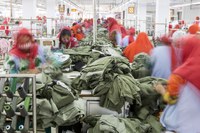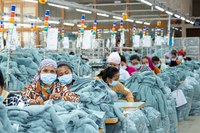Contributions Overview

Be the Change Summit 2023: The Future of Fashion in Asia
Singapore Fashion Council presents Be the Change Summit: An industry discussion of the challenges and opportunities facing Asia’s growing fashion sector.

New Labour Regimes in Southeast Asia
This conference seeks to bring labour back in at the centre of the analysis.

Textile & Fashion Forum Helsinki 2023
Textile & Fashion Forum Helsinki provides industry insights, interesting discussions, inspiring speakers and business cases from across Europe.

The Road to Regulatory Compliance
Regulatory upheaval and standards convergence is causing large scale disruption.

International CSR & Sustainability Summit Cambodia
Sustainability as the Great Equalizer

Welcome to the SS24 schedule with 31 physical showcases alongside events, talks, presentations, and activations.

Twice a year in New York City, thousands of international exhibitors gather to connect with buyers for the largest sourcing event on the East Coast.

The International Accord - Securing Health & Safety in the Textile and Garment Industry
This session is part of the Global Union Asia & Pacific Organizing Forum 2023.







